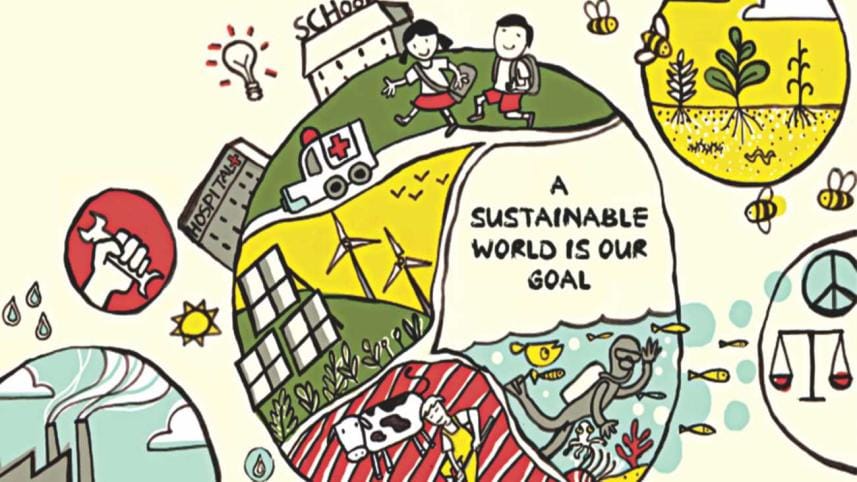Where do we stand today?

The 17 Sustain-able Development Goals (SDGs) of the 2030 Agenda for Sustainable Development were adopted on September 25, 2015 at the 70th session of the United Nations General Assembly. The 2030 Agenda is a plan of action emphasising on the core principles of peace, people, planet, prosperity and partnership, which seeks to strengthen universal peace, prosperity and freedom. Eradicating poverty, including extreme poverty, has been recognised as the greatest global challenge and an indispensable requirement for sustainable development. During the coming fifteen years, with these new goals that universally apply to all, countries will mobilise efforts to end all forms of poverty through accelerated growth, fight inequalities and tackle climate change, while ensuring that no one is left behind.
In Bangladesh, the implementation of the 7th Five Year Plan (FYP) 2016-2020 and SDGs have started concomitantly. Both the documents share the same core objectives like empowering people, ensuring prosperity, encouraging innovation, advancing peace, strengthening partnership, protecting the planet. The 7th FYP (2016-2020) has targeted an average of 7.4 percent annual GDP growth per year, which is higher than the targeted 7 percent for least developed countries under the SDGs. A total of 15 goals (88 percent) are found to be fully aligned, thematically, with the 7th FYP (National Planning Tool for socio-economic development), while only Goal 16 and 17 (12 percent) are partially aligned. A total of 58 SDG targets (34 percent) are fully aligned with the 7th FYP targets, while 11 SDG targets (7 percent) have no relevance to Bangladesh.
The government of Bangladesh has formed a high-level inter-ministerial SDG Implementation and Monitoring Committee. An office of Principal Coordinator for SDG Affairs has been established in the Prime Minister's Office (PMO) to coordinate and facilitate the overall implementation and monitoring of SDGs. Secretaries of 16 key ministries are members of the committee and are working closely with the Principal Coordinator. The General Economics Division (GED) of Bangladesh Planning Commission is the secretariat for the committee to coordinate the implementation at policy level, along with monitoring and reporting the SDG attainment status of Bangladesh.
Bangladesh has done the mapping of ministries/divisions by SDG targets (who is to do what in terms of targets) identifying 40 ministries/divisions, including the PMO and Cabinet Division as the lead entity to implement 162 targets of SDGs (7 not relevant for Bangladesh). Line ministries have been asked to prepare their SDG Implementation Action Plan by March 2027. Ministries/divisions will identify the actions or interventions to achieve the SDG targets in conformity with the 7th FYP. Further, ministries/divisions will comply with the Action Plans by preparing possible actions/interventions during and beyond the 7th FYP until 2030.
Finally, GED is preparing the Action Plan to Implement SDGs through Five Year Plans, in consultation with all the relevant ministries and divisions. This will come out as a published document by mid-May this year.
A preliminary data gap analysis for monitoring SDGs has already been conducted by the General Economics Division (GED) in cooperation with the Bangladesh Bureau of Statistics. Data Gap Analysis found that data on only 70 indicators are available (out of 230) in the existing data generating system of Bangladesh and 108 can be generated by modifying the existing census (from aggregation to disaggregation), survey, MIS, etc. Some of these 70 indicators for which data is available are also lagging behind, in cases by even up to five years. A handbook on data gap analysis has already been published by GED, identifying areas of data gap. On the basis of the findings of SDG Data Gap Analysis, the SDG Monitoring Framework is being prepared. Bangladesh National Statistical Agency (BBS) has started data mining/generating for some important indicators.
NGOs, CSOs, Development Partners (DPs), private sectors and the media have been consulted to ensure their involvement in SDG implementation. Thematic and goal-wise consultations with stakeholders from private sector along with DPs have been carried out regarding the action plan and monitoring framework. The development partners of Bangladesh have also been requested to align their country strategies within the framework of the SDG targets relevant for Bangladesh. SDGs and their associated targets would be reflected in ministries' annual work plans as well as in Annual Performance Agreement (APA) within ministries.
To facilitate the results based monitoring system within the government, a macro-level data repository system (SDG Tracker) is being developed by Access to Information (a2i) Project at PMO to facilitate GED. An SDG tracker will be established with the help of a2i of PMO to analyse the data for tracking and evaluating the status of SDG attainment. GED has also started to prepare the SDGs Needs Assessment and Costing exercise for Bangladesh, to estimate the resources needed for achieving SDGs in Bangladesh by 2030 (USD 3-5 trillion would be required annually throughout the world). The study is underway and is expected to be finalised in April and will also be published by mid-May this year.
All-out efforts for implementing SDGs are underway. We aspire to be an outstanding performer to attain the SDGs, as we did in the case of MDGs.
Bangladesh will participate in submitting the upcoming report, where the focus will be on where we are in terms of implementing Agenda 2030, to the High Level Political Forum (HLPF) of UN in July 2017. Forty countries in the world have expressed their willingness to present the voluntary National Reviews in 2017 -- Bangladesh being one of them.
The writer is Member (Senior Secretary), General Economics Division, Bangladesh Planning Commission.
E-mail: sambau23@gmail.com
 For all latest news, follow The Daily Star's Google News channel.
For all latest news, follow The Daily Star's Google News channel.
Comments